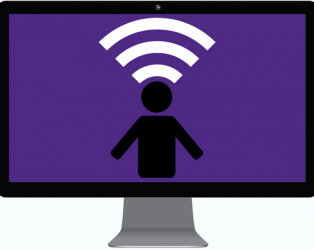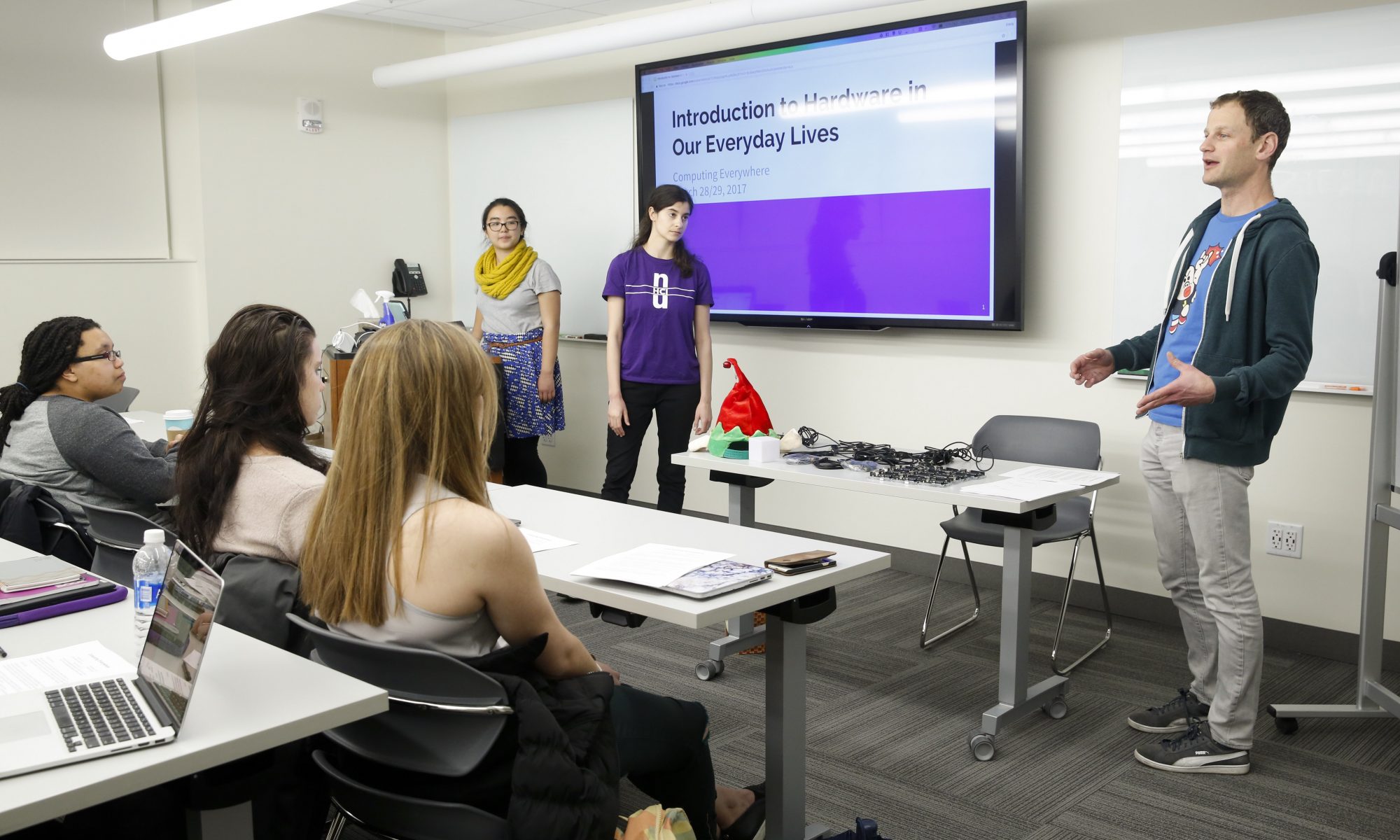Northwestern University graduate students in TSB, MTS, Computer Science, Learning Sciences and related fields are welcome to be Computing Everywhere instructors. There are two instruction opportunities available to share computing knowledge: 1) Seminar Series Workshops and 2) One-Time Workshops. Please read on for essential information regarding these opportunities.
Seminar Series Workshops
Help! I’m looking to share my computing knowledge in a formal setting! Computing Everywhere Seminar instructors develop and teach two-hour workshops that addresses at least one fundamental concept of computational literacy.
Excellent! What is a “fundamental concept?” We’re working that out. Please provide input and draw inspirations from this Google document. This list will help us determine adequate coverage of topics for students enrolled in the seminar.
And “computational literacy?” Topics could include the role of algorithms in everyday life, elementary programming and computational thinking, how to have conversations with programmers/software engineers, big data, etc. The overall goal is that workshops familiarize students with important computational concepts or ways of approaching problems as a programmer or in working with programmers.
I understand. Can I teach with a partner? Yes! You may apply as an individual or in pairs.
Who will I be teaching? Students who are looking to become more conversant in computation. Although this is a Communication Studies class, it’s open to all NU students without a technical background.
Okay, I’ve got a concept I’m both highly interested and highly knowledgeable in. What’s next? Our very detailed call for proposals have what you need to apply in the Fall quarter. Check it out to apply to teach.
Got it. I apply in the Fall quarter. When do I teach? You will teach your workshop twice during either the Winter or Spring quarters.
What do I get from teaching? The opportunity to share your experience, impact the future of computing, and $700 (per instructor).
Quite an opportunity. How many times can I apply? It’s generally expected that you are part of no more than two Computing Everywhere proposals during each academic calendar year.
Cool beans. Cool beans, indeed.
One-Time Workshops
Well this is new. How are these different from Seminar Series Workshops?One-Time Workshops need not be part of a series and need not conform to any specific time or curriculum requirements. Some of these will likely be longer-format (i.e., half- or full-day deeper dives on a particular topic) seminars, but innovative workshops of any type are welcome. It is generally expected that workshops will be consistent with the Computing Everywhere objectives of being lightweight, broadly accessible, low-pressure and low-risk.
Like the Seminar Series, can I teach with a partner? Yes! You may apply as an individual, in pairs, or even a small group.
Alright. What kind of topics fit the mold? The overall goal is to improve computational literacy for students. Topics could include the role of algorithms in everyday life, elementary programming and computational thinking, how to have conversations with programmers/software engineers, big data, etc. The overall goal is that workshops familiarize students with important computational concepts or ways of approaching problems as a programmer or in working with programmers. Think outside the box for something engaging within the mold!
What kind of students fit the mold? The intended audience for these workshops are School of Communication students with interests in digital media, user experience and HCI but with very little or no programming/technical experience.
This is for me. What’s next? Check out our very detailed call for proposals. This runs through everything you need to apply to teach.
Got it. Any timeline to apply? Applications for One-Time Workshops may be submitted at any time and will be reviewed on a rolling basis, but must be submitted at least 7-8 weeks prior to the desired quarter of instruction. It’s generally expected that you are part of no more than two Computing Everywhere proposals during each academic calendar.
What do I get from teaching? You will be paid at a rate roughly commensurate with the Seminar Series Workshop rate ($700 for a two-hour workshop taught twice), but the exact amount will be agreed on once the proposal is approved. Like the Seminar Series Workshops, you also have the opportunity to share your experience and impact the future of computing.
My mind is blown. Yup.
Additional Roles of Instructors
In addition to developing and facilitating a workshop, there are a few extra tasks that Computing Everywhere instructors are expected to help with during their quarter of instruction. These are:
-
Peer mentoring on lesson plans:
Every instructor (or pair, sometimes) will be paired with another instructor (or pair) to provide peer feedback and mentoring on lesson planning. This should, at minimum, include commenting on a document and an in-person discussion about plans and areas for possible improvement.
-
Faculty coordinator lesson plan meetings:
Every instructor (or pair) will meet with coordinator Jeremy Birnholtz at least once to go over their lesson plans and get feedback for possible improvement. These meetings will typically start in the quarter prior to instruction.
-
One administrative job from the list below:
Every instructor (or pair, where helpful) will volunteer to help with some administrative aspect of the course. These mostly do not involve significant effort, but it is expected that they will be taken seriously and completed in a timely manner.
The following jobs need to be finalized/claimed for each quarter:
-
Syllabus Creator:
Gets instructor bios and workshop descriptions, creates syllabus, works with Launch Coordinator and Canvas Coordinator to be sure students get paper and online copies.
-
Course Launch Coordinator:
Works with all instructors to get materials together, get course roster, etc. to ensure that the course is ready to go on time and starts smoothly.
-
Student POC:
Serves as the primary email point of contact for students. Should appear at the first workshop in person to introduce him/herself. Email and other contact info should appear in syllabus and on Canvas.
-
Canvas Coordinator:
Responsible for the overall maintenance and updating of the course Canvas site. Creates the initial configuration and design.
-
Feedback Solicitor:
Responsible for generating the student feedback form used at the end of each workshop, recording the feedback and passing on to the instructor (which can be done simply by sharing it in the Google space).
-
Attendance Coordinator:
Responsible for ensuring that all instructors accurately take attendance each week, tracking attendance (e.g., via Canvas or any other reliable means), following up with students with poor attendance and then assigning an S or U to each student by the end of Week 6.
What to Expect
Coming soon!
Extra Pay Form
Fill out and submit this form as soon as possible after you have been accepted as a Computing Everywhere instructor!

